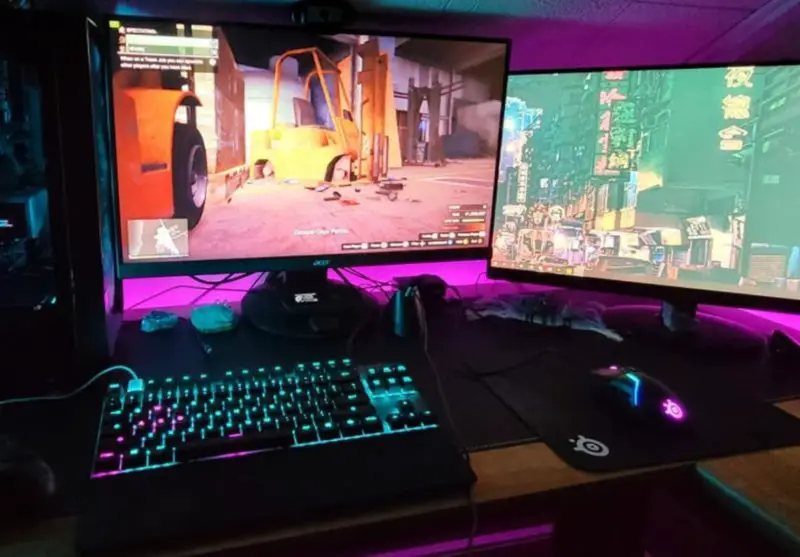In terms of the overall system performance of gaming PCs, an SSD can make your setup feel much faster. As a result, SSDs have become more of an essential component of the best gaming PCs in the market. It’s not only good for loading into games quickly, but it’s also one of the ways you can improve your entire desktop experience. If you combine a good SSD with an equally good graphics card and the best gaming CPU, you’ll have a ring that is about as crisp as you can get, especially if you install your OS on the SSD. By now, you are probably wondering whether you need an SSD for a gaming PC. Well, read on because we have just the answer for you!
An SSD isn’t a compulsory necessity for a gaming PC. However, an SSD will help reduce game load times. Instead of spending a lot of time waiting for a game while it loads, an SSD enables your gaming PC to load a game faster, thus saving you time. If you have the money, getting an SSD for your gaming PC would be a good upgrade. All applications would load faster with an SSD, and hang-ups that happen when it would remove gaming for long periods. SSDs also reduce hitching in open-world games. Hitching refers to brief pauses in games when they can’t pull assets from the hard drive fast enough to keep up with a player.
To put things into context, with an SSD in your gaming PC rig, you could load game levels much more quickly. The drastic reduction in load times can be attributed to the higher data transfer speed of SSDs (over 400MB/S) compared to that of HDDs (170MB/S). At some point in time, having a small SSD as a boot drive was a luxury. Now, with the emergence of 4K and next-gen gaming, if you want your games to load fast and to enjoy fluid gaming experiences, investing in a quality SSD is your best bet. In this article, we will discuss all that relates to having an SSD for a gaming PC.
Why Is SSD Necessary in a Gaming PC?
Speaking strictly, an SSD isn’t required in a gaming PC. However, having an SSD in your gaming PC will give you some benefits that you otherwise wouldn’t have. These include:
- Faster load times– A dramatic difference between SSDs and HDDs is the time spent waiting for games to load. SSDs can save you a few minutes of game load times in every play session and hours in the long run.
- Faster OS boot times– You are installing an SSD results in less time waiting for your operating system to start before you can play games or do something else. A new PC that has an SSD usually boots faster when compared to an HDD. SSDs have superior data transfer speeds, and this can save you minutes of waiting.
- Smoother gameplay– Most games perform thousands of tiny read and write operations as you play. This can result in hundreds of megabytes of data transfers. This can result in hitching, which is brief pauses in games when they can not pull assets from your hard drive fast enough to keep up with a player. SSDs reduce the occurrence of hitching in open-world games resulting in smoother gameplay.
Can I Game Without an SSD?
As long as you have a good CPU, RAM, GPU, and storage, you can game without an SSD. An SSD will make your game loading times much faster, but if you have enough RAM, there will be no noticeable effect on gameplay if you don’t have an SSD in your gaming PC.
Some games such as Just Cause 3 or GTA V have long load times (due to large maps and many in-game objects to render). Having an SSD can help you see a good improvement in load times.
So yes, you can play games without an SSD.
What Size SSD Do I Need for Gaming?
When shopping for an SSD, one important consideration is the storage capacity. If you get one with a small capacity, there won’t be enough room for the OS and other programs. On the other hand, a drive that’s too large is just wasted space that won’t get used.
Games can take a lot of space. If you are a serious gamer, then you should invest in a 1TB drive. On the other hand, if you don’t play that often, then a 512GB gaming SSD should do. A 500GB SSD is a minimum for gamers, and anything less than that will likely hinder your gaming experience.
Do Games Run Better on SSD?
Games that are installed on an SSD usually boot faster than games installed on traditional hard drives. SSDs store your game’s data for retrieval whenever you want to play. They help in that they can find and pull up that data faster, and so if you install a game on your SSD, any point that requires loading a new screen will take less time.
In addition to speeding up load times, SSD also prevents hitching, which is brief pauses when gaming. So to answer the question, yes. Games do tend to run better on SSDs.
The SSD I Use and Love
This SSD’s capacity varies from 256GB to 512GB, to 1TB and 2TB. If you are looking to get one, a 1TB or 2TB can be a great option that can store your OS and a ton of games. On average, it can cost you up to $120 to get this for your system.
I use the WB Blue 1tb. I bought it on amazon when I built my first gaming PC.
This is widely regarded as the best SSD for gaming. It offers super-fast speed at a relatively lower price. The speed with the Add link S70 is up to 3,400MB/S read speed and 3,000MB/S write speed. It has amazing endurance and compelling performance.
A good SSD for a gaming PC is an important component to ensure a speedy and responsive gaming experience. In full Solid State Drives, SSD’s won’t give you a significant performance boost over traditional hard drives, but they offer a small performance boost in some instances. If we are entirely honest, an SSD won’t give you a better gaming performance. It won’t give you a higher framerate in your favorite games, nor will it improve the actual performance of the games themselves. However, as we have already discussed, an SSD will significantly reduce game load times and save you loads of time.

